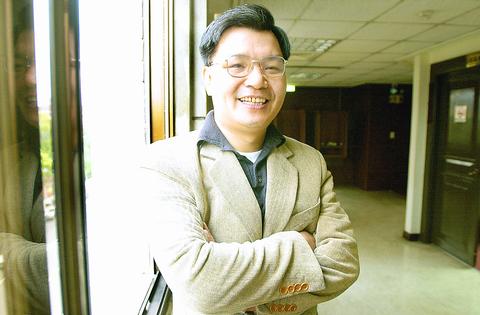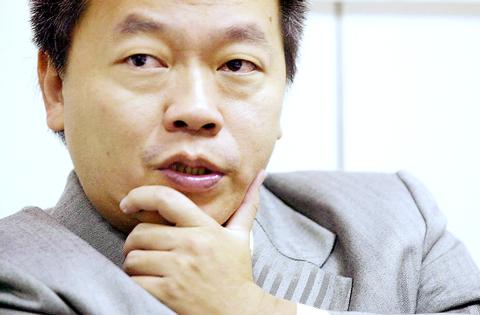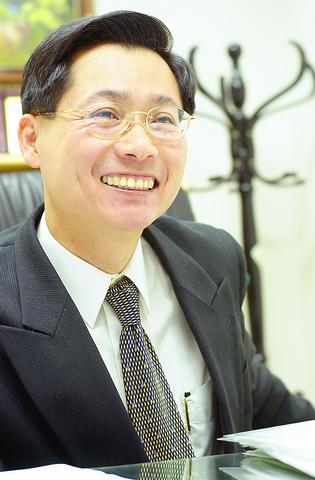Lawmakers Lee Wen-chung (李文忠) and Lai Chin-lin (賴勁麟), as well as former National Assembly delegate Liu I-te (劉一德) are among the young politicians running in the DPP primary for year-end legislative elections, and have been recognized as the first generation of student activists from the early 80s. When Taiwan was ruled under a state of emergency, they had their names permanently emblazoned upon the history of the student movement for pushing for direct elections of the head of National Taiwan University's student union, and an end to censorship of the school's publications.
The three have been involved with the DPP since its earliest days, having encouraged the party's founding. They are founding members of the party and assisted with the party's development. Now that the party is in power, they intend to turn their attention to helping improve the party's performance in government.


Lee Wen-chung
For most college students, to get dismissed from school would be a huge setback. But not for 42-year-old Lee Wen-chung. Expelled from National Taiwan University (NTU) in 1986, the student activist struggled to find another path for himself, turning him into the prominent political star he is today.

Majoring in political science, the DPP lawmaker was born into a poverty-stricken family and in college showed himself to be a revolutionary.
Greatly influenced by the blossoming democratic movement in the 1980s, Lee was active both on and off campus pushing for democratization.
Outside of school, he devoted himself to campaigning for tang wai (黨外 -- literally "outside the party," ie, non-KMT) candidates during elections, and working as an editor for tang wai magazines. At school, he called for campus democracy by requesting a direct election for the leader of the students' association. Although his goal was achieved after great efforts, Lee paid a very high price. The school authorities claimed he was "excessively politically progressive," and he was expelled from the university.
Declining to bow before the unjust punishment, Lee launched a week-long hunger strike on campus. But the action, which made him a school hero, failed to win back his place on the student body.
The event drove him even closer to tang wai, because he totally "lost his interest in studying."
"`What can I do without a bachelor's degree?' I asked myself," recalled Lee. "Nothing, because I was not able to live up to social expectations like other college graduates by doing something like pursuing graduate studies. And I knew chances were slim for a college drop-out to find a good job, and I was not interested in making money anyway. People don't live just to make money."
Lee said he had been raised to believe in the existence of social justice. But a whirlwind of political events -- such as the Formosa Incident (美麗島事件) in 1979 (when a group of pro-democratic activists were arrested after an anti-government parade), and the murder of the daughters and mother of Lin I-hsiung (林義雄) (the former DPP chairman and one of the victims in the incident) a few weeks later -- shattered those convictions.
Outraged that people could be thrown into prison because of their quest for liberty and democracy, Lee resolved to fight on against the KMT regime.
His first step was to join the labor movement just as it emerged in Taiwan after decades of harsh KMT repression.
"It was quite a natural choice for me because I was interested in nothing else but fighting for the benefits of the under-privileged," said Lee.
A few years after his involvement in the labor movement, he was elected to become a National Assembly deputy in 1991. Since entering the political area, he has gotten reputation for subtlety of thought and deft in political skills. Following two terms in the National Assembly, he was elected a lawmaker in 1998.
When questioned about how he coped with the pressure from voters concerning his dovish stance on the Fourth Power Plant project -- he had appealed to the ruling DPP to take into account its political weakness in a legislature dominated by the opposition -- the lawmaker, seeking his second term, responded honestly.
"Our political forefathers -- the Formosa generation -- risked their lives to uphold their beliefs. Politicians can't simply be obsessed about votes. They should have the guts to hold firmly to their principles and also constantly examine whether their words and deeds are right," Lee said.
Liu I-te
Known for his extreme measures in fighting for a more democratic campus, 40-year-old Liu I-te, the former National Assembly deputy and now the director of the DPP's Department of Organizational Development, was considered one of the first trailblazers in the student movement of the early 1980s.
"Liu was a charismatic and strategic leader," said Lee Wen-chung, commenting on the days when he and his longtime friend battled together for students' rights.
"Not intimidated by any penalization, Liu would resort to more drastic measures, such as mounting posters or painting words of protest to challenge the school's bureaucracy. At a time when espousing Taiwanese independence was a taboo subject in society, Liu was daring enough to openly advocate the idea at school."
Wreathed in smiles, Liu was proud of being a staunch protester as a student.
"The school administration suspended our club, which was organized to denounce unreasonable systems, and banned our magazines -- a primary avenue to disseminate our ideas. But nothing stopped me. I attracted more and more followers instead, with whom I teamed up to pursue our objectives," Liu said.
When asked what drew him to be involved in the democracy movement, Liu recalled a traumatizing experience he underwent in Chiayi Senior High School.
"One time I initiated a discussion concerning the corruption case of a local politician in class. Unexpectedly, a classmate who said I was attempting to spread anti-government remarks, tipped the school authorities off about me. I consequently got slapped in the face by a military instructor for refusing to write a confession letter," he said.
"It was a significant event in my life because I was furious for having being reprimanded when I had done nothing wrong. My interests shifted as a result, and incited the rebellious side of me. After originally opting to study medicine, I decided to major in social science instead in the hope of creating change in a society that lacked justice."
During the years he worked towards the goal of Taiwan's democratization, Liu stood out for his ethnic background as a mainlander, as the movement was viewed more of a choice for Taiwanese -- the exploited group under an administration dominated by mainlanders.
Growing up in a community of mainlander soldiers and their families, Liu said he was driven by sympathetic sentiment toward Taiwanese and from his understanding of Taiwan's history. He also carried a sense of guilt for being viewed as an oppressor due to background.
"The Feb. 28 Incident in 1947 was a tragic chapter of Taiwanese history, when thousands of Taiwanese were killed by the mainlander-led government. Anyone who understands this part of our history would abhor the mainlanders' atrocities," he said.
Considering himself a stern advocate of Taiwan's independence, Liu said he was a firm believer in ethnic assimilation.
"I don't think there should be any `Chinese' in Taiwan after the last 50 years [since the KMT retreated to Taiwan in 1949]. All should be assimilated by Taiwanese culture. In my opinion, Hokkien should be made an official language," Liu said in fluent Hokkien.
The two-term National Assemblyman, who brought himself national fame for pushing for the marginalization of the National Assembly last April, is vying for a legislative seat. Liu said he would exert similar efforts to downsize the legislature if elected this December.
"The current number [of lawmakers] in the legislature is too big to hold an efficient meeting. The number of seats should be reduced by half," he said.
Lai Chin-lin
Judging by his gentle appearance, it is hard to imagine 38-year-old Lai Chin-lin as an aggressive protester who has fought in almost every battle to demand students' rights, and who tirelessly participated in the labor movement during the 1980s.
But the DPP lawmaker, who has concentrated on environmental and social welfare issues in the legislature, was a bold activist from the onset of his college years until becoming a publicly elected representative in 1991.
Lai, who grew up in the countryside of central Taiwan and was not exposed much to politics in his teens, says 1979, when the US changed its diplomatic ties from Taiwan to China, was a turning point in his life.
"It was at that time I realized how important it was for a country to maintain strong international relations, and it was at that same time that I discovered how incapable our government was when it came to dealing with foreign affairs. The event raised my interest in politics and influenced my choice of international affairs as my major," said Lai.
Lai, along with Lee and Liu, teamed up for events such as pushing for direct elections for the leader of the student union, and terminating censorship in the school's publishing. Like many other activists, Lai was penalized by the school and the University Forum -- the club which he headed -- was suspended.
But Lai says that these punishments had a positive impact because they also acted as catalysts for him to become further involved in politics.
"The fact that our club was forced to shut down by the school pushed me further toward the tang wai activists outside the school," Lai recalled.
"I felt a sharp contrast between the two environments. In society, people were irate because everything was so controlled under the White Terror laws as freedom of expression was strictly suppressed. But at school, students were extremely indifferent to what was really going on in the world."
Dispirited by his schoolmates' apathy and the oppression of school authorities, Lai turned to the tang wai for solace.
After he graduated from college, Lai dedicated himself to the labor movement to assist in forming unions and to aid the working class in demanding the rights they deserved.
In the last decade, Lai was elected as a National Assembly delegate twice. He was elected a legislator in 1998.
Unlike Liu I-te -- a hard-line social reformer -- and Lee Wen-chung -- an articulate public figure -- Lai is shy, modest, and not adept at promoting himself in comparison to most of his counterparts. But in the eyes of his friends, Lai is an honorable and down-to-earth individual, who always puts the interests of others ahead of his own.
"It seems like he is not cut out for politics since he is not as eloquent as most politicians. But he is a respected man, who takes his words seriously and always keeps his promises," said Liu I-te.
For Lee Wen-chung, Lai is a man full of a sense of justice. "He adheres to his principles, and never cares about the price he will pay as long as it is for what he believes is right," said Lee.

MAKING WAVES: China’s maritime militia could become a nontraditional threat in war, clogging up shipping lanes to prevent US or Japanese intervention, a report said About 1,900 Chinese ships flying flags of convenience and fishing vessels that participated in China’s military exercises around Taiwan last month and in January last year have been listed for monitoring, Coast Guard Administration (CGA) Deputy Director-General Hsieh Ching-chin (謝慶欽) said yesterday. Following amendments to the Commercial Port Act (商港法) and the Law of Ships (船舶法) last month, the CGA can designate possible berthing areas or deny ports of call for vessels suspected of loitering around areas where undersea cables can be accessed, Oceans Affairs Council Minister Kuan Bi-ling (管碧玲) said. The list of suspected ships, originally 300, had risen to about

DAREDEVIL: Honnold said it had always been a dream of his to climb Taipei 101, while a Netflix producer said the skyscraper was ‘a real icon of this country’ US climber Alex Honnold yesterday took on Taiwan’s tallest building, becoming the first person to scale Taipei 101 without a rope, harness or safety net. Hundreds of spectators gathered at the base of the 101-story skyscraper to watch Honnold, 40, embark on his daredevil feat, which was also broadcast live on Netflix. Dressed in a red T-shirt and yellow custom-made climbing shoes, Honnold swiftly moved up the southeast face of the glass and steel building. At one point, he stepped onto a platform midway up to wave down at fans and onlookers who were taking photos. People watching from inside

Japan’s strategic alliance with the US would collapse if Tokyo were to turn away from a conflict in Taiwan, Japanese Prime Minister Sanae Takaichi said yesterday, but distanced herself from previous comments that suggested a possible military response in such an event. Takaichi expressed her latest views on a nationally broadcast TV program late on Monday, where an opposition party leader criticized her for igniting tensions with China with the earlier remarks. Ties between Japan and China have sunk to the worst level in years after Takaichi said in November that a hypothetical Chinese attack on Taiwan could bring about a Japanese

The WHO ignored early COVID-19 warnings from Taiwan, US Deputy Secretary of Health and Human Services Jim O’Neill said on Friday, as part of justification for Washington withdrawing from the global health body. US Secretary of State Marco Rubio on Thursday said that the US was pulling out of the UN agency, as it failed to fulfill its responsibilities during the COVID-19 pandemic. The WHO “ignored early COVID warnings from Taiwan in 2019 by pretending Taiwan did not exist, O’Neill wrote on X on Friday, Taiwan time. “It ignored rigorous science and promoted lockdowns.” The US will “continue international coordination on infectious